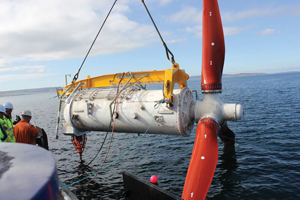Global News said in a February 6 article that Irish energy company DP Energy is proposing a 156-acre solar energy production facility within Calgary city limits. If approved, it would be the largest in Western Canada.
DP Energy describes its development as two adjacent solar projects on brownfield sites in Southeast Calgary: Barlow Trail Solar and Deerfoot Solar, with a combined generation capacity of 55 MW. One of the projects sits on landfill that’s been sealed off and the surface stabilized in order to support the PV racks. The projects will use a ballasted foundation system on capped phosphogypsum stacks owned by Viterra Inc. to ensure the integrity of the stack is maintained.
However, in a February 9 article, Medicine Hat News describes a proposed Saamis Solar, another solar power project by DP Energy, eight times larger at 200 MW, on a 1000-acre brownfield site in the City of Medicine Hat, also on a capped waste site. The Medicine Hat story says that facility “could be years away from fruition,” but the company is moving ahead with its proposal in Calgary.
DP Energy has also announced it is developing the world’s largest tidal stream turbine array across two berths at the Fundy Ocean Research Centre for Energy (FORCE) facility in the Bay of Fundy, Nova Scotia, Canada.
 An Andritz Hydro tidal turbine (Photo: Andritz)
The company is managing the development of two berths in the Bay of Fundy as a single project under the banner Uisce Tapa (pronounced Ish ka Ta Pa, meaning fast running water in Gaelic). The Project will incorporate five Andritz Hydro Mk1 1.5 MW sea-bed mounted tidal turbines and a single SR2-2000 floating turbine by Scotrenewables Tidal Power Limited. At 9MW this will make it the largest tidal stream array to be deployed anywhere in the world.
An Andritz Hydro tidal turbine (Photo: Andritz)
The company is managing the development of two berths in the Bay of Fundy as a single project under the banner Uisce Tapa (pronounced Ish ka Ta Pa, meaning fast running water in Gaelic). The Project will incorporate five Andritz Hydro Mk1 1.5 MW sea-bed mounted tidal turbines and a single SR2-2000 floating turbine by Scotrenewables Tidal Power Limited. At 9MW this will make it the largest tidal stream array to be deployed anywhere in the world.
DP Energy notes that it has been working closely with both turbine suppliers for the past two years, during which time turbines from both manufacturers have been successfully deployed in real sea environments in Scotland. In the case of Andritz, the three Mk1 turbines installed at the MeyGen Project have produced a cumulative output of more than 8GWh since their deployment in late 2016 whilst the SR1-2000 prototype deployed by Scotrenewables at the EMEC facility in Orkney has produced more than 3GWh since October 2017.
The project benefits from a 15-year 9 MW Feed-In Tariff at a rate of $530/MWh, with the current programme seeing the turbines deployed at the FORCE site by the end of 2020.
See also “Tidal turbine in Nova Scotia the first operational,” elsewhere this issue.
